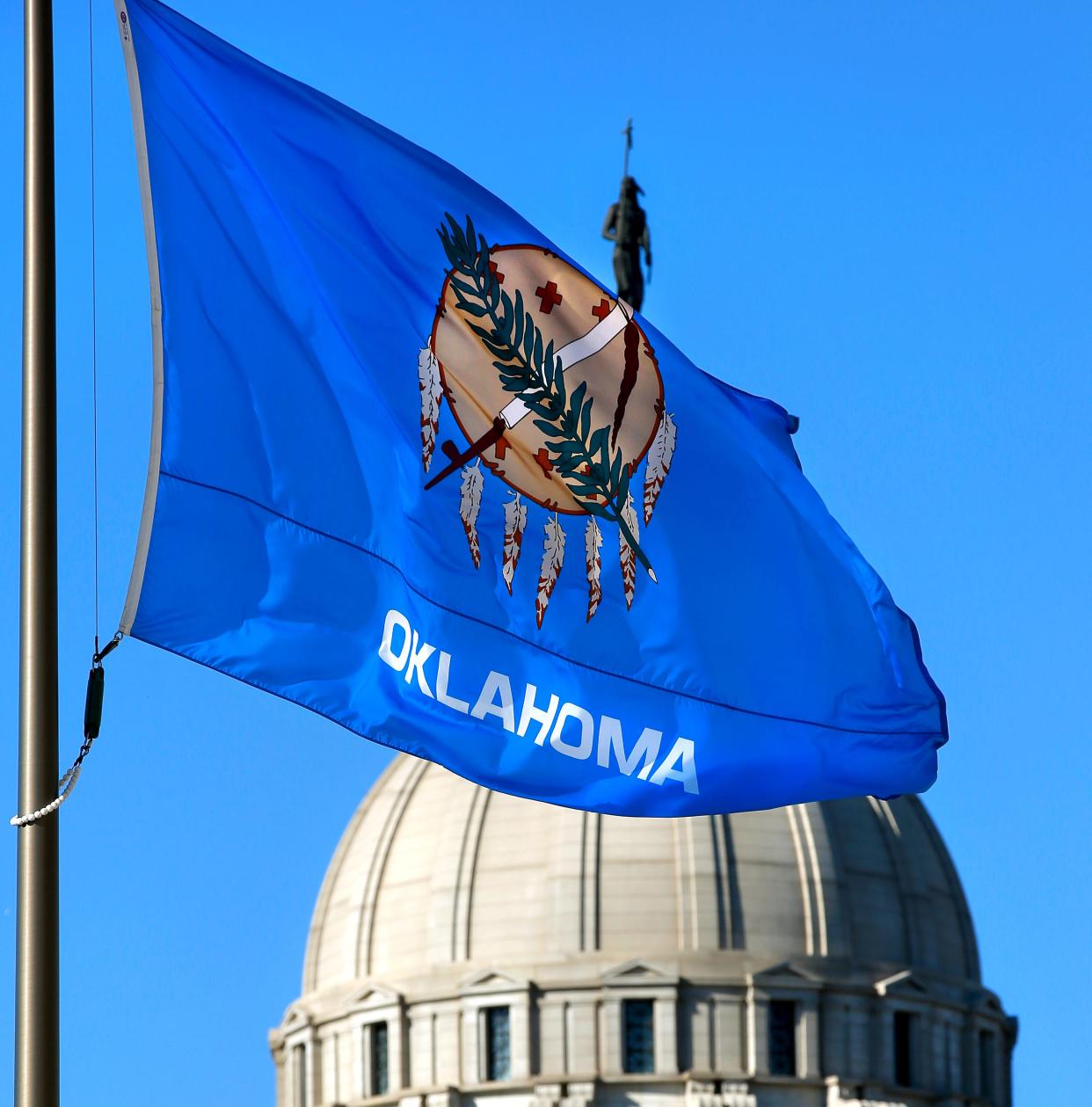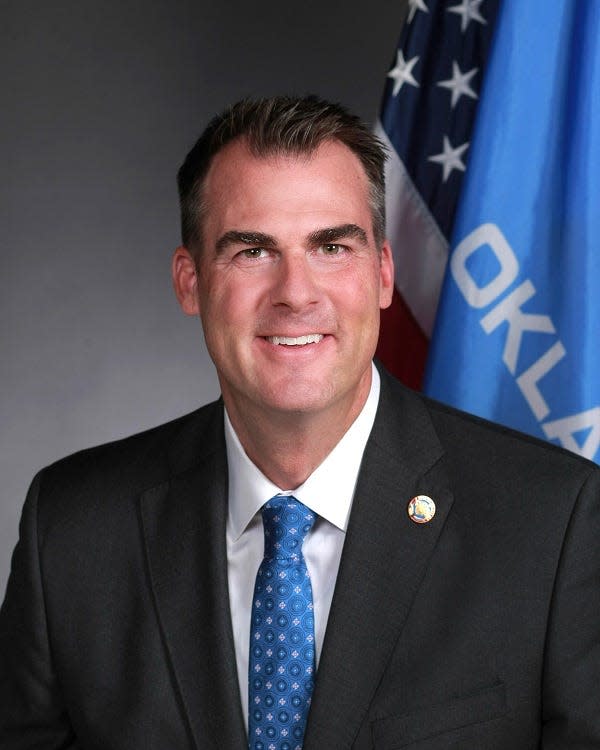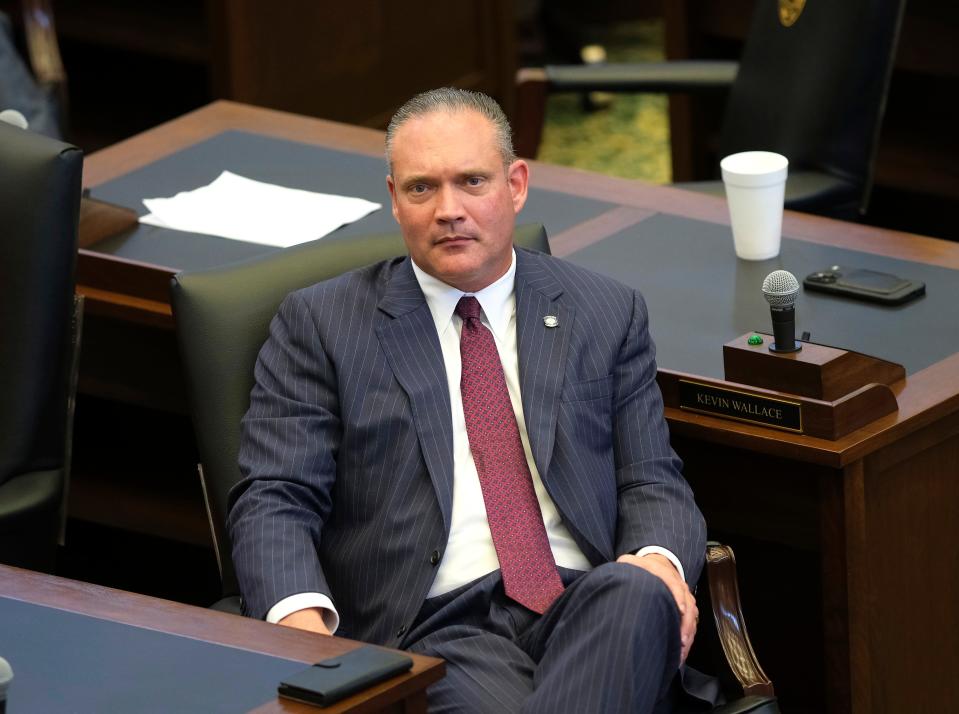Clash over jurisdiction: What tribal leaders, Gov. Stitt, others say will move Oklahoma forward

- Oops!Something went wrong.Please try again later.
When Gov. Kevin Stitt invited tribal leaders to his second inauguration in January, the gesture seemed to telegraph a new period of cooperation after the quarrelsome, litigious years with the state’s tribal nations during his first term in office. But the combative relationship continues with disagreements over jurisdiction, Stitt's efforts to renegotiate compact fees and more. Even bills that had little to do with adding to the state’s coffers ― on whether students can wear tribal regalia at their graduation and whether to continue the Oklahoma Advisory Council on Indian Education ― were vetoed, prompting legislative overrule. Approving those bills could have indicated a symbolic move toward easing tensions between Stitt and the tribes.
Oklahoma is the home of 39 tribal nations whose ancestors of many were forcibly marched here. Today, Native American symbols are emblazoned on the state flag. The state’s name is from an Indigenous language. At least more than half a million Oklahomans claim Native American heritage, and tribal enterprises bring more than $15 billion in economic impact to the state. Believe them when tribal leaders say they’re here to stay, and their rising prosperity “will lift all boats to new heights.”
But the erosion of trust is clear, yet overriding that is a unifying voice among tribal leaders for working together "through cooperation and compromise” with Stitt and state leaders for a better Oklahoma.
This edition of Viewpoints focuses on tribal relations, including what sovereignty means, misconceptions about the U.S. Supreme Court's McGirt ruling and tribal contributions to the state. We also invited tribal leaders and Gov. Stitt to comment on the current state of relations and what’s needed to get all sides on an amicable path toward cooperation. And Charles McCall, speaker of the Oklahoma House of Representatives, weighs in on why Stitt's lawsuits against tribal compact laws do not promote the aspiration of "One Oklahoma" but undermine decades of cooperation with the state's tribal partners.
As attorney Mike McBride III observes, "It's time for détente" to "focus on issues of mutual importance to Oklahomans."
― Clytie Bunyan, managing editor for diversity, community engagement & opinion
How tribal sovereignty benefits Oklahoma
Tribal sovereignty brings multifaceted advantages to our state to help ensure a stronger, more prosperous Oklahoma for all of us, writes Carla D. Pratt, the Ada Lois Sipuel Fisher Chair in Civil Rights, Race and Justice at the College of Law at the University of Oklahoma. Read her full column, here.
Gov. Kevin Stitt: I'll fight for one Oklahoma
Gov. Kevin Stitt says he wants great companies and good jobs, things that aren’t available if there isn’t rule of law in Oklahoma. Read the governor's full column, here.

Attorney: Tribal jurisdiction is settled
Gov. Kevin Stitt has said he's trying to protect eastern Oklahoma from turning into a reservation. An attorney says that ship has sailed.
Grading Oklahoma: Tribes by the numbers
Oklahoma is home to 39 tribal nations, which bring $15.6 billion in economic revenue. However, they are more likely to be murdered or go missing than any other demographic. For more statistics, check out this week's Grading Oklahoma.
Charles McCall: A different view on one Oklahoma
One Oklahoma means finding a path forward that works for the good of all Oklahomans, writes state House Speaker Charles McCall. Read his column, here.

What are tribal leaders saying?
Several tribal leaders shared their thoughts about tribes' relationship with the state.
Cherokee Principal Chief Chuck Hoskin Jr.: 'Tribes continue to be the best friend the state has ever had.'
Choctaw Nation Chief Gary Batton: 'Our love for the state is not diminished by retaining our sovereignty.'
Chickasaw Nation Gov. Bill Anoatubby: 'We believe this rising tide (of success) will lift all boats to new heights.'
Osage Nation Principal Chief Geoffrey Standing Bear: 'Negative and false rhetoric ... against tribal nations is dramatics, not law.'
Muscogee Nation Principal Chief David Hill: Every issue the governor seeks to lay at the feet of tribal sovereignty is an outcome of his own making.
History offers lessons
History shows the way for how Oklahomans could live well together, writes Amanda Cobb-Greetham, the 2023-24 Guggenheim Fellow Professor in the Department of Native American Studies at the University of Oklahoma. Read her column here.
Tribes have a big economic impact on state
Tribal government programs and services yield cost savings to Oklahoma, writes Kyle Dean, a professor of economics and director of the Native American and Urban Studies Center at Oklahoma City University's Meinders School of Business. Read his column here.
Celebrating cultures makes state stronger
Let’s celebrate the vibrant Indigenous cultures that make up Oklahoma, build a stronger state and foster healthier communities in the process, writes Linda Capps, vice chairman of the Citizen Potawatomi Nation.
Public Square: Addressing tribal challenges
We asked Native Americans what current challenges they see facing their tribal nations and what first steps should be taken to address them. Some of their responses can be found here.

Time to rewrite Oklahoma's narrative
Gov. Kevin Stitt's current stance with Oklahoma's Native American tribes may echo the state's past, but it doesn't have to dictate its future, writes Kevin Chuculate, a writer and student at the University of Oklahoma completing his Master of Legal Studies in Indigenous Law.
Doctor: A 'top 10 state' in health care?
New program should increase health care access, make referrals easier, writes Dr. Doug Cox is a practicing physician, the medical director for the Wyandotte Nation of Oklahoma, and co-chair of the Aetna provider-led entity.
Where do freedmen fit in?
Freedmen and their descendants once flourished as tribal members, writes Marilyn Vann, president of the nonprofits Descendants of Freedmen of the Five Civilized Tribes Association and African Indians of the 5 Civilized Tribes Foundation. Read her column here.
This article originally appeared on Oklahoman: Guest columnists share thoughts about tribal nations, Oklahoma

